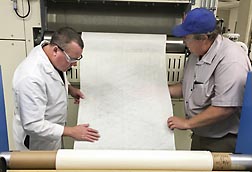| Read the magazine story to find out more. |
|
|
|
|
New Cotton Disposable Disinfecting Wipes-Effective, Biodegradable
By Rosalie Marion Bliss
June 27, 2016
People concerned about the environmental impact of synthetic disposable wipes accumulating in landfills can now take comfort in U.S. Department of Agriculture (USDA) scientists' progress in developing disinfecting wipes made from nonwoven cotton that are biodegradable.
Disposable disinfecting wipes made from synthetic fibers are effective and convenient. They are soaked in a solution that contains germ-killing compounds called "quats." These compounds release readily from synthetic fibers, allowing the wipes to disinfect properly. Unfortunately, synthetic fibers decompose slowly in landfills. Cotton fibers, while biodegradable and thus better for the environment, do not readily release the germicide.
That soon could change.
Agricultural Research Service (ARS) scientists have discovered new chemical formulations that allow quats to release readily from nonwoven cotton fibers, resulting in hospital-grade disinfecting cotton wipes that are both effective and biodegradable.
Research leader Brian Condon, molecular biologist Doug Hinchliffe, and colleagues in the ARS Cotton Chemistry and Utilization Research Unit in New Orleans, Louisiana, worked on the project with Cotton Incorporated.
The ARS team tested a quat called "ADBAC," a stable, cost-effective active ingredient in synthetic disposable disinfecting wipes particularly effective on hard surfaces. The quat adhered so strongly to the surface of cotton fibers that it failed to release in amounts sufficient to disinfect hard surfaces.
The ARS team developed new chemical formulas that block quats from adhering strongly to the surface of cotton fibers. The result is a cotton wipe that releases quats for surface disinfection that is strong, abrasive and fully biodegradable.
In the study, the cotton wipe containing the new ADBAC formula killed four microorganisms of great concern in healthcare environments, including MRSA (methicillin-resistant Staphylococcus aureus) and VRE (vancomycin-resistant Enterococcus), which are of particular concern in hospitals.
Research partner Cotton Incorporated will be marketing this technology. Adopters of the new technology will conduct further testing to broaden the list of microorganisms the wipes can disinfect.
Read more about this research in the June 2016 issue of AgResearch.
ARS is USDA's chief intramural scientific research agency.
